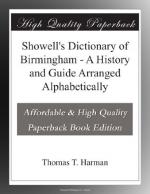Small, Dr. William.—A friend of Boulton, Watt, and Priestley, and one of the famous Lunar Society, born in county Angus, Scotland, in 1734, dying here in 1778. A physician of most extensive knowledge, during a residence in America he filled the chair of Professor of Natural Philosophy at the University of Williamsburg, Virginia. In the beautiful pleasure grounds of Soho House, when Matthew Boulton lived, there was an urn inscribed to the memory of Dr. Small, on which appeared some impressive lines written by Dr. Darwin, of Derby:—
“Here, while no titled dust, no
sainted bone,
No lover weeping over beauty’s
bier,
No warrior frowning in historic stone,
Extorts your praises, or requests
your tear;
Cold Contemplation leans her aching head,
On human woe her steady eye
she turns,
Waves her meek hand, and sighs for Science
dead,
For Science, Virtue, and for
SMALL she mourns.”
Smith.—Mr. Brooke Smith (of the well-known firm of Martineau and Smith), a valued supporter of Penn Street and Dale Street Industrial Schools, the Graham Street Charity, and other institutions connected with the welfare of the young, died in April, 1876, in his 78th year. A Liberal in every way, the sound common sense of Mr. Brooke Smith, who was noted for an unvarying courtesy to all parties and creeds, kept him from taking any active share in local politics where urbanity and kindliness is heavily discounted.
Sturge, Joseph.—Born August 2, 1793, at Alberton, a village on the Severn, was intended for a farmer, but commenced trading as a cornfactor at Bewdley, in 1814, his brother Charles joining him in 1822, in which year they also came to Birmingham. Mr. Sturge was chosen a Town Commissioner, but resigned in 1830, being opposed to the use of the Town Hall being granted for oratorios. He was one of the directors of the London and Birmingham Railway when it was opened in 1836, but objecting to the running of Sunday trains, withdrew from the board. In 1838 he was elected Alderman for St. Thomas’s Ward, but would not subscribe to the required declaration respecting the Established religion. At a very early date he took an active part in the Anti-slavery




